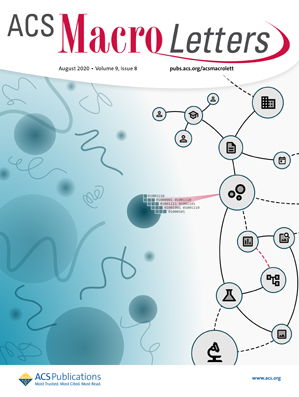通过亲核硫醇炔聚合将二硫键引入聚酯生物材料。
IF 5.2
Q1 POLYMER SCIENCE
引用次数: 0
摘要
聚酯由于其(生物)可降解性和可调节的热机械性能而被广泛应用于一类生物材料。在它们的主干中引入动态二硫键,使它们能够通过不同的途径降解,并赋予它们自愈的特性。然而,尽管存在许多将二硫键引入线性聚合物的聚合方法,但这些方法缺乏生产具有不同热机械性能的材料所需的多功能性。在这项工作中,亲核巯基炔聚合被用于合成具有可控数量的二硫键在主链中的聚合物。这些聚合物的结晶度和热机械性能是通过不同参数的变化来调整的,如二硫键含量、聚合物主结构特征(即E/Z异构)和单体组合。此外,聚合物的可降解性被证实利用可逆二硫键存在的化学刺激。最后,证明了这些聚合物的细胞相容性,表明它们作为高分子生物材料的潜在用途。本文章由计算机程序翻译,如有差异,请以英文原文为准。
Introducing Disulfide Bonds into Polyester Biomaterials via Nucleophilic Thiol-yne Polymerization.
Polyesters are a widely used class of biomaterials thanks to their (bio)degradability and tunable thermomechanical properties. Introducing dynamic disulfide bonds into their backbone enables them to be degraded through different routes and also imparts self-healing properties. However, while numerous polymerization protocols exist with which to introduce disulfide bonds into linear polymers, these methods lack the versatility needed to produce materials with diverse thermomechanical properties. In this work, nucleophilic thiol-yne polymerization was employed to synthesize polymers with a controllable amount of disulfide bonds in the backbone. The crystallinity and, hence, the thermomechanical properties of these polymers were tuned through the variation of different parameters such as disulfide bond content, polymer backbone conformational features (i.e., E/Z isomerism), and monomer combinations. Moreover, polymer degradability was confirmed by leveraging the reversible disulfide bonds in the presence of chemical stimuli. Finally, the cytocompatibility of these polymers was demonstrated, suggesting their potential use as polymeric biomaterials.
求助全文
通过发布文献求助,成功后即可免费获取论文全文。
去求助
来源期刊
CiteScore
10.40
自引率
3.40%
发文量
209
审稿时长
1 months
期刊介绍:
ACS Macro Letters publishes research in all areas of contemporary soft matter science in which macromolecules play a key role, including nanotechnology, self-assembly, supramolecular chemistry, biomaterials, energy generation and storage, and renewable/sustainable materials. Submissions to ACS Macro Letters should justify clearly the rapid disclosure of the key elements of the study. The scope of the journal includes high-impact research of broad interest in all areas of polymer science and engineering, including cross-disciplinary research that interfaces with polymer science.
With the launch of ACS Macro Letters, all Communications that were formerly published in Macromolecules and Biomacromolecules will be published as Letters in ACS Macro Letters.

 求助内容:
求助内容: 应助结果提醒方式:
应助结果提醒方式:


